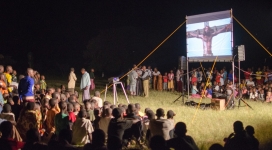At least 19 faith-based organizations are among the 160 initial signers of a new Code of Good Practice for NGOs Responding to HIV/AIDS.
"Faith communities all across the globe are living with HIV and AIDS, and are also on the front line of responding with care, support, and education for prevention", says Linda Hartke, coordinator of the Ecumenical Advocacy Alliance. "We must accept the challenge to carry out this work in ways that promote good practices - effective and collaborative services and advocacy - in the context of the global response."
The Code of Good Practice was developed through a steering committee of 11 organizations, including the World Council of Churches (WCC), to ensure accountability and quality programming in response to the expanding involvement of a diverse number of NGOs in prevention and treatment of HIV and AIDS.
Among the faith-based organizations that have signed the code : Action by Churches Together (ACT) International, Bread for the World, Christian Aid, Church of Sweden, the Conference of European Churches, DanChurchAid, Diakonie Emergency Aid, Difaem - German Institute for Medical Mission, Ecumenical Advocacy Alliance, Ecumenical Coalition on Tourism, Hope for Eastern Europe, the Lutheran World Federation (LWF), Lutheran World Relief, Norwegian Church Aid, the World Alliance of Reformed Churches (WARC), the World Alliance of YMCAs, the World Council of Churches (WCC), the World Student Christian Federation, the World YWCA.
By signing on to the Code, NGOs publicly signal their endorsement of its principles and their commitment to implement the programming principles in the Code relevant to their own work.
In reflecting on the need for the Code, WCC general secretary Rev. Dr Sam Kobia emphasized Jesus' healing ministry as the challenge for churches to be healing communities. "Faith communities and organizations do not exist in a vacuum", he stated. "Church workers all over the world have a responsibility to ensure that our organizations are engaged with civil society in key issues such as HIV and AIDS. Endorsing this Code signifies WCC's moral commitment to concerted efforts towards the eradication of the pandemic," he said.
"The Code of Good Practice is an instrument that will urge and strengthen responses of faith-based organizations in developing a vision, a commitment and a plan of action that will promote and protect the human rights of people living with HIV and AIDS," states Rev. Dr Setri Nyomi, general secretary of the World Alliance of Reformed Churches. He adds, "It will encourage organizations to be equipped with skills for effective leadership, upholding the respect, integrity and dignity of all persons, including special consideration for women and young people who are most vulnerable."
The purpose of the Code is to:
* build wide commitment to principles and practices that underscore successful NGO responses to HIV and AIDS;
* assist NGOs to improve the quality and cohesiveness of their work and their accountability to partners and beneficiary communities;
* foster greater collaboration among the variety of NGOs now actively engaged in responding to the HIV and AIDS pandemic, and
* renew the 'voice' of NGOs responding to HIV and AIDS by committing to a shared vision of good practice in our programming and advocacy.
Dr Musimbi Kanyoro, secretary general of the World YWCA, notes that the Code "has a check list that will be useful for us in the work on HIV/AIDS". She also emphasizes that the code will keep them "connected to other people working on the same subject and to check on ourselves whether we are going in the right direction".
"Signing the code means we can't just do business as usual," states Dr Bart Shaha, secretary general of the World Alliance of YMCAs. "For us the Code is a declaration of what we believe we must do so that our work can have a bigger impact," he says. "It's a sign of our joint commitment to eradicating the scourge of HIV/AIDS."
Organizations signing the Code encourage other faith-based organizations to also consider the principles it contains. "This is an important initiative and I hope and trust it will receive broad support," says Dr Kathryn Wolford, moderator of the executive committee of ACT International. "Many ACT members are already incorporating best practices on HIV/AIDS into our humanitarian programs and this helps equip others to do likewise," adds Dr Wolford, who is also president of Lutheran World Relief.
"The values underlying the Code, e.g. fighting discrimination and stigma, and ensuring access to care, correspond with those expressed in the Lutheran World Federation HIV/AIDS Action Plan and Campaign," says LWF general secretary, Rev. Dr Ishmael Noko. "It is our hope that this Code of Good Practice will become a benchmark document for quality programming in the various spheres of life that determine our courageous and intensified responses to the challenges of the AIDS pandemic," he concludes.
Participants in the Ecumenical Advocacy Alliance actively participated in the consultation process on the Code in draft form, bringing faith-based perspectives and experience.
The International Federation of Red Cross and Red Crescent Societies hosts the Code of Good Practice project. The deadline for signing on to the Code was 29 October 2004. When the Project's second phase, to support implementation of the Code, commences in 2005, an ongoing mechanism for NGOs to sign on to the Code will be provided.
For more information on the Code of Good Practice, including the Code and a full list of NGO signatories see:
http://www.ifrc.org/what/health/hivaids/code/







